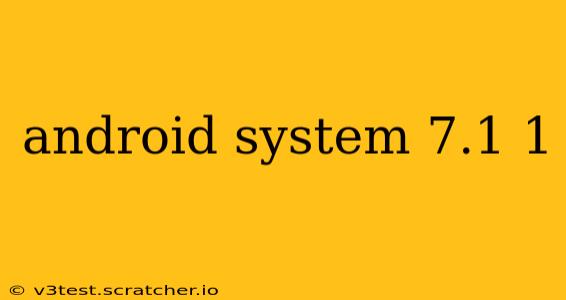Android 7.1.1, a minor update to Android 7.0 Nougat, brought several refinements and improvements to the Android experience. While not as groundbreaking as major Android releases, 7.1.1 provided valuable enhancements for users and developers alike. This post delves into the key features and improvements of Android 7.1.1, addressing common questions and providing valuable insights.
What are the Key Features of Android 7.1.1?
Android 7.1.1 focused on iterative improvements rather than sweeping changes. Key features included:
-
Improved App Shortcuts: This update enhanced the functionality of app shortcuts, making it easier to access frequently used features directly from the app icon on the home screen. This streamlined workflow and increased efficiency for users.
-
Image Keyboard Support: 7.1.1 introduced better support for image keyboards, enabling more creative and expressive text input methods. This was a significant step forward for accessibility and personalized communication.
-
Enhanced Developer APIs: The update included several new APIs for developers, giving them more tools to create innovative and engaging applications. These APIs focused on areas like app shortcuts, keyboard functionality, and system stability.
-
Bug Fixes and Performance Improvements: As with any minor update, Android 7.1.1 addressed numerous bugs and performance issues found in previous versions, leading to a smoother and more stable user experience. This often included improvements in battery life and overall system responsiveness.
Is Android 7.1.1 Still Supported?
No, Android 7.1.1 is no longer officially supported by Google. This means that it will no longer receive security updates, leaving devices running this version vulnerable to exploits and malware. It's crucial to upgrade to a newer Android version for security and stability.
What are the Differences Between Android 7.0 and 7.1.1?
While sharing the same Nougat base, Android 7.1.1 offered several improvements over the initial 7.0 release. The most notable differences include the enhanced app shortcuts, image keyboard support, and numerous bug fixes and performance optimizations. 7.1.1 essentially refined and polished the features already present in 7.0.
How Can I Update My Android Device from 7.1.1?
Since Android 7.1.1 is outdated, upgrading directly from it is impossible. You'll need to update to a significantly newer version of Android. The process varies depending on the device manufacturer and model. Generally, you can check for updates by going to your device's Settings > System > System Update. However, due to the age of 7.1.1, the update may not be available. You may need to consider a factory reset, but always back up your data first. Contact your device manufacturer for specific instructions for your phone or tablet.
Is Android 7.1.1 Safe to Use?
Given that it's no longer receiving security updates, Android 7.1.1 is not recommended for continued use. The lack of security patches puts your device and personal data at significant risk. Upgrading to a current Android version is essential to protect your device from malware and vulnerabilities.
What are the Downsides of Using Android 7.1.1?
The primary downside is the absence of security updates, making the device vulnerable to cyber threats. Furthermore, many apps may no longer be compatible, limiting access to new features and potentially affecting performance. Finally, newer features and improvements introduced in later Android versions are unavailable.
This detailed look at Android 7.1.1 highlights its place in Android history. While a significant step in Android's evolution, the lack of ongoing support means it's crucial to upgrade to a more current and secure operating system.
